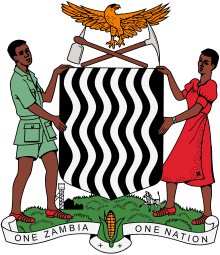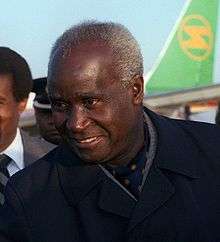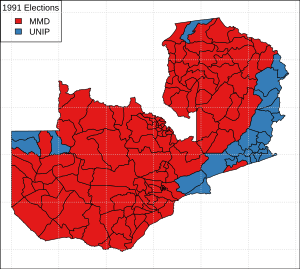Zambian general election, 1991
| | |||||||||||||||||||||||||||||||
| |||||||||||||||||||||||||||||||
| |||||||||||||||||||||||||||||||
|
| |||||||||||||||||||||||||||||||
| |||||||||||||||||||||||||||||||
 |
| This article is part of a series on the politics and government of Zambia |
|
|
Government |
|
Legislature |
General elections were held in Zambia on 31 October 1991 to elect a President and National Assembly. They were the first multi-party elections since 1968, and only the second multi-party elections since independence in 1964. The United National Independence Party (UNIP), which had led the country since independence (from 1973 to 1990 as the sole legal party), was comprehensively beaten by the Movement for Multi-Party Democracy (MMD). Incumbent President Kenneth Kaunda, head of state since independence, was defeated in a landslide by MMD challenger Frederick Chiluba in the presidential elections, whilst the MMD won 125 of the 150 elected seats in the expanded National Assembly. Voter turnout was 45%.[1]
Background
In 1973, Kaunda had declared UNIP the only legally permitted party in Zambia. From then until 1990, the government and UNIP were effectively one. Every five years, UNIP's leader--Kaunda--was automatically elected to a five-year term as president. Voters also chose between three UNIP candidates for each of the 125 seats in the National Assembly.
By the summer of 1990, however, discontent had built to a fever pitch, with riots and an attempted coup. Kaunda first announced a referendum for on the single-party system, which was rejected as insufficient by the opposition. In September, Kaunda bowed to the inevitable and gave his support to constitutional amendments that would end UNIP's monopoly of power. He also announced that the general elections scheduled for 1993 would be advanced to 1991.[2]
Kaunda signed the necessary amendments into law in December. Soon afterward, the Movement for Multi-Party Democracy, a pressure group created earlier in the year under the leadership of Zambia Congress of Trade Unions chairman Chiluba, registered as a political party.[3]
Results
President
| Candidate | Party | Votes | % |
|---|---|---|---|
| Frederick Chiluba | Movement for Multi-Party Democracy | 972,212 | 75.76 |
| Kenneth Kaunda | United National Independence Party | 311,022 | 24.24 |
| Invalid/blank votes | 41,531 | – | |
| Total | 1,324,765 | 100 | |
| Registered voters/turnout | 2,926,457 | 45.27 | |
| Source: EISA | |||
National Assembly
| Party | Votes | % | Seats | +/– |
|---|---|---|---|---|
| Movement for Multi-Party Democracy | 931,945 | 74.01 | 125 | New |
| United National Independence Party | 314,711 | 24.99 | 25 | –100 |
| National Democratic Alliance | 1,695 | 0.13 | 0 | New |
| National Democratic Party | 803 | 0.06 | 0 | New |
| Democratic Party | 120 | 0.01 | 0 | New |
| Independents | 9,862 | 0.78 | 0 | New |
| Presidential appointees | – | – | 8 | –2 |
| Appointed Speaker | – | – | 1 | 0 |
| Invalid/blank votes | 46,787 | – | – | – |
| Total | 1,305,689 | 100 | 159 | +23 |
| Registered voters/turnout | 2,875,960 | 45.40 | – | – |
| Source: EISA | ||||


